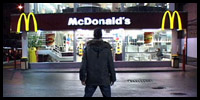
 |
|
Super Size Me (2004) 2004 – 96 minutes Not Rated (equivalent of a PG or PG-13 for thematic elements and sexual references) Reviewed by Dustin Putman, May 22, 2004.  A comically informative documentary about obesity in America and the fast food corporations that drive the problem, "Super Size Me" won acclaim at the 2004 Sundance Film Festival for its no-holds-barred, often very funny look at a subject most people would likely be too afraid to tackle. Director Morgan Spurlock has succeeded in making a consistently entertaining cinematic experience, but his obvious goal in mimicking the alternately jokey and serious style of Michael Moore (2002's "Bowling for Columbine") is where he somewhat falters. Spurlock is no Michael Moore, and he is unable to dig very far beneath the surface of his subject matter to find the bigger themes.
A comically informative documentary about obesity in America and the fast food corporations that drive the problem, "Super Size Me" won acclaim at the 2004 Sundance Film Festival for its no-holds-barred, often very funny look at a subject most people would likely be too afraid to tackle. Director Morgan Spurlock has succeeded in making a consistently entertaining cinematic experience, but his obvious goal in mimicking the alternately jokey and serious style of Michael Moore (2002's "Bowling for Columbine") is where he somewhat falters. Spurlock is no Michael Moore, and he is unable to dig very far beneath the surface of his subject matter to find the bigger themes.
 There is little information offered in "Super Size Me" that will surprise or enlighten most audience members, as it is common knowledge fast food is unhealthy and riddled with fat, sugar, and cholesterol. What documentarian Morgan Spurlock achieves at, then, is to simply get viewers to consider the dietary choices they make in their own life, without feeling the need to get preachy. People may know what they are eating is bad for them, after all, but it is a film like "Super Size Me" that may nudge them in the right direction toward reevaluating what they put in their mouth.
There is little information offered in "Super Size Me" that will surprise or enlighten most audience members, as it is common knowledge fast food is unhealthy and riddled with fat, sugar, and cholesterol. What documentarian Morgan Spurlock achieves at, then, is to simply get viewers to consider the dietary choices they make in their own life, without feeling the need to get preachy. People may know what they are eating is bad for them, after all, but it is a film like "Super Size Me" that may nudge them in the right direction toward reevaluating what they put in their mouth.
 The film's premise hinges on an experiment Spurlock tests out on himself. For an entire month, he vows to eat three square meals per day of nothing but McDonald's food. He has to try everything on the menu at least once, and when asked if he would like to "super size it," he must accept. As the days tick by, Spurlock's health, checked by doctors, deteriorates at an alarmingly rapid rate. His normal weight balloons 25 pounds, his blood pressure and cholesterol skyrocket, and his sexual performance (explained by his girlfriend) noticeably suffers. Even more surprising, Spurlock's liver comes dangerously close to failing; one doctor likens its state to one that has been poisoned by longtime alcohol abuse. Amidst it all, Spurlock finds himself becoming addicted to McDonald's food, getting hit by bouts of depression during the day until he gets his next Big Mac fix. If anything, "Super Size Me" makes a convincing, thought-provoking case toward the addictive qualities of fast food, much like one's addiction to smoking.
The film's premise hinges on an experiment Spurlock tests out on himself. For an entire month, he vows to eat three square meals per day of nothing but McDonald's food. He has to try everything on the menu at least once, and when asked if he would like to "super size it," he must accept. As the days tick by, Spurlock's health, checked by doctors, deteriorates at an alarmingly rapid rate. His normal weight balloons 25 pounds, his blood pressure and cholesterol skyrocket, and his sexual performance (explained by his girlfriend) noticeably suffers. Even more surprising, Spurlock's liver comes dangerously close to failing; one doctor likens its state to one that has been poisoned by longtime alcohol abuse. Amidst it all, Spurlock finds himself becoming addicted to McDonald's food, getting hit by bouts of depression during the day until he gets his next Big Mac fix. If anything, "Super Size Me" makes a convincing, thought-provoking case toward the addictive qualities of fast food, much like one's addiction to smoking.
 Too often, however, "Super Size Me" is content to prattle off factual data and statistics while failing to explore the what's, why's, and how's of it. For example, Spurlock tells us the Houston, Texas was the country's fattest city last year, overtook in 2004 by Detroit. But why is this, and how was this information gather? We never find out. Whereas Michael Moore is able to take a subject, such as gun violence, and expand such a topic in emotionally resounding ways that speak to greater themes within American culture, Morgan Spurlock's study is not as encompassing or emphatic.
Too often, however, "Super Size Me" is content to prattle off factual data and statistics while failing to explore the what's, why's, and how's of it. For example, Spurlock tells us the Houston, Texas was the country's fattest city last year, overtook in 2004 by Detroit. But why is this, and how was this information gather? We never find out. Whereas Michael Moore is able to take a subject, such as gun violence, and expand such a topic in emotionally resounding ways that speak to greater themes within American culture, Morgan Spurlock's study is not as encompassing or emphatic.
 There is no doubt that "Super Size Me" is a fascinating piece of work, a film that not only works as a documentary but as an endlessly intriguing and grin-inducing narrative. The animated look at the way a chicken nugget from McDonald's is processed is both pricelessly funny and horrifying. Meanwhile, Spurlock's tireless attempts to set up an interview with the McDonald's corporation are met with dead ends. Nevertheless, shortly after this film's premiere at Sundance, McDonald's announced that they would be doing away with their "super sized" meals. This single action speaks louder than any words or excuses that the heads of McDonald's could have ever come up with had they agreed to comment on Spurlock's study. "Super Size Me" is a worthwhile documentary, and an important one, but it isn't very deep. One thing is certain, though. Viewers walking out of theaters showing "Super Size Me" will not even think about stopping at a fast food joint on their way home. In fact, they may not go back for quite some time. Or ever.
There is no doubt that "Super Size Me" is a fascinating piece of work, a film that not only works as a documentary but as an endlessly intriguing and grin-inducing narrative. The animated look at the way a chicken nugget from McDonald's is processed is both pricelessly funny and horrifying. Meanwhile, Spurlock's tireless attempts to set up an interview with the McDonald's corporation are met with dead ends. Nevertheless, shortly after this film's premiere at Sundance, McDonald's announced that they would be doing away with their "super sized" meals. This single action speaks louder than any words or excuses that the heads of McDonald's could have ever come up with had they agreed to comment on Spurlock's study. "Super Size Me" is a worthwhile documentary, and an important one, but it isn't very deep. One thing is certain, though. Viewers walking out of theaters showing "Super Size Me" will not even think about stopping at a fast food joint on their way home. In fact, they may not go back for quite some time. Or ever.
|
© 2004 by Dustin Putman |














